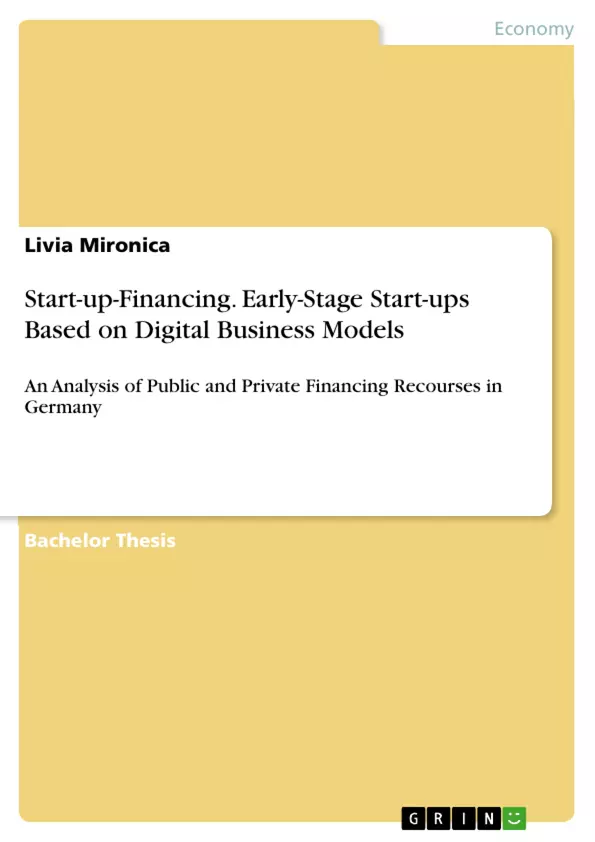This bachelor thesis aims to clarify which financing options exist for early-stage start-ups. These are systematized into private and public investment recourses and are explained individually.
Given that digital start-ups have different goals and financial needs, this work aims to identify and evaluate the benefits and drawbacks of different sources of financing, ranging from lower investment funding to high-volume funding. In addition, this thesis is intended to provide an overview of the distinction between financing programs that will facilitate the decision of the entrepreneur when selecting the right mix of financing instruments for their digital start-up. Therefore, the motivation of this thesis is to present and critically assess different types of funding sources for early-stage digital start-ups in Germany and compare all relevant factors when choosing a particular financing instrument.
Inhaltsverzeichnis (Table of Contents)
- Introduction
- Research Objectives
- Structure and Proceedings
- Theoretical Basics for Digital Start-ups
- Entrepreneurship vs. E-Entrepreneurship
- Start-up: Definition and Characteristics
- Digital Business Model: E-Business Start-ups
- Financial Barriers for Young Digital Start-ups
- Public and Private Financing Recourses of Digital Start-ups in Germany
- Early-stage Digital Start-up Financing
- Private Financing Sources
- Bootstrapping and FFF
- Business Angels
- Crowdfunding
- Incubators/Accelerators
- Venture Capital
- Public financing sources
- Incubators/Accelerators
- Public Loans
- Grants
- Governmental Venture Capital
- Conclusion and Outlook
Zielsetzung und Themenschwerpunkte (Objectives and Key Themes)
This bachelor thesis aims to analyze the financing resources available to early-stage digital start-ups in Germany. The research focuses on both public and private financing options, exploring their characteristics, advantages, and disadvantages. The thesis investigates the challenges faced by digital start-ups in securing funding and provides insights into the factors that influence financing decisions.
- Digital Business Models and Entrepreneurship
- Financing Challenges for Early-Stage Digital Start-ups
- Public and Private Financing Sources in Germany
- Characteristics and Impact of Different Financing Options
- Factors Influencing Financing Decisions
Zusammenfassung der Kapitel (Chapter Summaries)
- Introduction: This chapter introduces the research topic and outlines the objectives and structure of the thesis. It highlights the significance of financing for early-stage digital start-ups and establishes the framework for the following chapters.
- Theoretical Basics for Digital Start-ups: This chapter provides a comprehensive overview of key concepts related to digital start-ups, including entrepreneurship, e-entrepreneurship, start-up characteristics, and digital business models. It also discusses the unique financial barriers faced by young digital ventures.
- Public and Private Financing Recourses of Digital Start-ups in Germany: This chapter delves into the specific financing resources available to digital start-ups in Germany. It explores both private and public financing options, providing detailed analyses of different sources such as bootstrapping, business angels, crowdfunding, incubators/accelerators, venture capital, public loans, grants, and governmental venture capital. It examines the characteristics, advantages, and disadvantages of each financing source and highlights their relevance to early-stage digital start-ups.
Schlüsselwörter (Keywords)
The key terms and concepts examined in this thesis include: digital start-ups, early-stage financing, entrepreneurship, e-entrepreneurship, digital business models, financial barriers, public financing, private financing, bootstrapping, business angels, crowdfunding, incubators/accelerators, venture capital, public loans, grants, governmental venture capital, Germany.
Frequently Asked Questions
What are the main financing options for early-stage digital start-ups?
Options include private sources like Bootstrapping, Business Angels, Crowdfunding, and Venture Capital, as well as public sources like grants and loans.
What is the difference between Bootstrapping and Venture Capital?
Bootstrapping involves using personal savings and internal cash flow, while Venture Capital involves high-volume external investment from professional firms in exchange for equity.
What role do Business Angels play in Germany?
Business Angels are private investors who provide capital, expertise, and networks to young start-ups, usually during the very early stages of development.
What are typical financial barriers for young digital start-ups?
Barriers include high initial costs, lack of collateral for traditional bank loans, and the high uncertainty associated with digital business models.
How do Incubators and Accelerators help start-ups?
They provide mentorship, office space, and sometimes seed funding to help start-ups speed up their growth and prepare for larger investment rounds.
- Citar trabajo
- Livia Mironica (Autor), 2021, Start-up-Financing. Early-Stage Start-ups Based on Digital Business Models, Múnich, GRIN Verlag, https://www.grin.com/document/1142401



